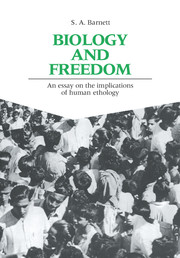Book contents
Part 5 - Homo sapiens: the human species
Published online by Cambridge University Press: 04 August 2010
Summary
Austin felt that he had a lot of reading to catch up on – too much. His head was a buzzing hive of awakened but directionless ideas. There was Freud who said that we must acknowledge our own repressed desires, and Jung who said that we must recognize our archetypal patterning, and Marx who said we must join in the class struggle and Marshall McLuhan who said we must watch more television. There was Sartre who said that man was absurd though free and Skinner who said he was a bundle of conditioned reflexes and Chomsky who said he was a sentence-generating organism and Wilhelm Reich who said he was an orgasm-having organism. Each book that Austin read seemed to him totally persuasive at the time, but they couldn't all be right … Wittgenstein said, whereof we cannot speak, thereof we must remain silent – an aphorism in which Austin Brierly found great comfort.
David LodgeTo end this book with a rival, supposedly complete, portrait of Homo sapiens would be pretentious and shallow; but there are questions, so far left open, to which it is possible to suggest answers. In the next chapter I describe, more fully than before, the consequences, logical and moral, of reducing human beings to genes or machines or, more generally, to nothing but physical systems. I also suggest a commonsense alternative. This is more than an academic issue: it has everyday, practical implications.
- Type
- Chapter
- Information
- Biology and FreedomAn Essay on the Implications of Human Ethology, pp. 225 - 228Publisher: Cambridge University PressPrint publication year: 1989



